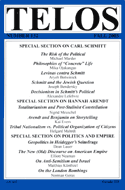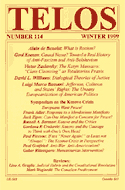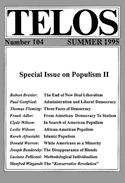By Frederick Wertz · Tuesday, December 11, 2012 As an occasional feature on TELOSscope, we highlight a past Telos article whose critical insights continue to illuminate our thinking and challenge our assumptions. Today, Frederick Wertz looks at Elliot Neaman’s “The New (Old) Discourse on the American Empire and the War in Iraq” from Telos 132 (Fall 2005).
 Critiques of American imperialism are easy to find at the domestic and the international level, especially in today’s partisan and reactionary political climate. The contemporary discourse is beginning to focus on the decline of the American empire, despite the fact that there is very little consensus as to whether or not America ever even had an empire to begin with, in any objective historical context. Critiques of American imperialism are easy to find at the domestic and the international level, especially in today’s partisan and reactionary political climate. The contemporary discourse is beginning to focus on the decline of the American empire, despite the fact that there is very little consensus as to whether or not America ever even had an empire to begin with, in any objective historical context.
In an article written in the midst of a heated debate about American imperialism and the War in Iraq, Elliot Neaman takes a step back from the fray and takes a look at the development of the contemporary discourse surrounding the issue. While the debate may or may not have evolved significantly from where it was in 2005, Neaman’s analysis of various critiques of American empire has enduring aspects that pertain far beyond the scope of American foreign policy. By looking at various pro- and anti-empire positions from both the Left and Right, we can draw meaningful lessons about the development of discourse and the interpretation of history.
Continue reading →
By Frederick Wertz · Monday, July 16, 2012 While supporters of the Affordable Care Act are celebrating the late-June decision upholding the constitutionality of the individual mandate, the biggest victory in the decision was for supporters of states’ rights. The sole provision struck down by the Court, Medicaid expansion, marked the first time the Supreme Court halted federal legislation based on the coercion theory. It may be that this somewhat overlooked aspect of the decision will have the greatest impact in future American politics. Coercion theory argues that the federal government can overstep its power by threatening to withhold federal funding if states do not bend to Congress’ will. Since the argument was first used in the 1936, the Court has been largely unwilling to even hear cases citing it as a main argument, and when it has, it has refused to validate the argument. The history of cases argued that cite such alleged coercion sheds much light on this recent decision. By looking closely at the coercion theory, one can see the enormous impact this recently validated argument will have in creating a new, 21st-century federalism.
In 1936, the validity of a tax imposed by the Social Security Act on employers was determined by the Supreme Court. In the case of Steward Machine Co. v. Davis, an Alabama corporation claimed the federal government had levied a tax on employers with the sole
Continue reading →
By Frederick Wertz · Wednesday, July 4, 2012 As an occasional feature on TELOSscope, we highlight a past Telos article whose critical insights continue to illuminate our thinking and challenge our assumptions. Today, Frederick Wertz looks at Luigi Marco Bassani’s “Jefferson, Calhoun and States’ Rights: The Uneasy Europeanization of American Politics,” from Telos 114 (Winter 1999).
 In an enlightening piece, Luigi Marco Bassani reopens the door on an all-too-closed chapter of American political discourse: states’ rights. He poses a question that he sees to be the crux of one of the most permanent issues in American history: “In 1776, did the thirteen colonies separate themselves from Great Britain collectively or singularly?” This question, regarding the role of the Federal government in American society, was the essence of American politics for nearly a century. Though political debate and war in the 19th century resulted in an irreversible consolidation of federal power, the issue still crops up in the American political ethos during times of crisis or extreme polarization. Bassani usefully highlights the two most important proponents of states’ rights, Thomas Jefferson and John C. Calhoun. In an enlightening piece, Luigi Marco Bassani reopens the door on an all-too-closed chapter of American political discourse: states’ rights. He poses a question that he sees to be the crux of one of the most permanent issues in American history: “In 1776, did the thirteen colonies separate themselves from Great Britain collectively or singularly?” This question, regarding the role of the Federal government in American society, was the essence of American politics for nearly a century. Though political debate and war in the 19th century resulted in an irreversible consolidation of federal power, the issue still crops up in the American political ethos during times of crisis or extreme polarization. Bassani usefully highlights the two most important proponents of states’ rights, Thomas Jefferson and John C. Calhoun.
Continue reading →
By Frederick Wertz · Friday, June 15, 2012 As an occasional feature on TELOSscope, we highlight a past Telos article whose critical insights continue to illuminate our thinking and challenge our assumptions. Today, Frederick Wertz looks at Franklin Adler’s “The Original Model of American Democracy and the Turn to Statism,” from Telos 104 (Summer 1995).
 In his well-known visit to the United States, Alexis de Toqueville was particularly struck by the invisibility of the American state: “Nothing strikes a European traveler in the United States more than the absence of what we would call government or administration. One knows that there are written laws there and sees them put into execution every day; everything is in motion around you, but the motive force is nowhere apparent.” At the time of his visit, the state governments of Europe were indeed gargantuan compared to that of the newly founded state across the pond. While such a gap used to be the main distinguishing characteristic between governments of the old world and new, few would disagree that today this gap has closed significantly. For better or worse, the government of the United States has taken a decidedly statist turn from its original model. In his well-known visit to the United States, Alexis de Toqueville was particularly struck by the invisibility of the American state: “Nothing strikes a European traveler in the United States more than the absence of what we would call government or administration. One knows that there are written laws there and sees them put into execution every day; everything is in motion around you, but the motive force is nowhere apparent.” At the time of his visit, the state governments of Europe were indeed gargantuan compared to that of the newly founded state across the pond. While such a gap used to be the main distinguishing characteristic between governments of the old world and new, few would disagree that today this gap has closed significantly. For better or worse, the government of the United States has taken a decidedly statist turn from its original model.
Continue reading →
|
|
 Critiques of American imperialism are easy to find at the domestic and the international level, especially in today’s partisan and reactionary political climate. The contemporary discourse is beginning to focus on the decline of the American empire, despite the fact that there is very little consensus as to whether or not America ever even had an empire to begin with, in any objective historical context.
Critiques of American imperialism are easy to find at the domestic and the international level, especially in today’s partisan and reactionary political climate. The contemporary discourse is beginning to focus on the decline of the American empire, despite the fact that there is very little consensus as to whether or not America ever even had an empire to begin with, in any objective historical context.  In an enlightening piece, Luigi Marco Bassani reopens the door on an all-too-closed chapter of American political discourse: states’ rights. He poses a question that he sees to be the crux of one of the most permanent issues in American history: “In 1776, did the thirteen colonies separate themselves from Great Britain collectively or singularly?” This question, regarding the role of the Federal government in American society, was the essence of American politics for nearly a century. Though political debate and war in the 19th century resulted in an irreversible consolidation of federal power, the issue still crops up in the American political ethos during times of crisis or extreme polarization. Bassani usefully highlights the two most important proponents of states’ rights, Thomas Jefferson and John C. Calhoun.
In an enlightening piece, Luigi Marco Bassani reopens the door on an all-too-closed chapter of American political discourse: states’ rights. He poses a question that he sees to be the crux of one of the most permanent issues in American history: “In 1776, did the thirteen colonies separate themselves from Great Britain collectively or singularly?” This question, regarding the role of the Federal government in American society, was the essence of American politics for nearly a century. Though political debate and war in the 19th century resulted in an irreversible consolidation of federal power, the issue still crops up in the American political ethos during times of crisis or extreme polarization. Bassani usefully highlights the two most important proponents of states’ rights, Thomas Jefferson and John C. Calhoun.  In his well-known visit to the United States, Alexis de Toqueville was particularly struck by the invisibility of the American state: “Nothing strikes a European traveler in the United States more than the absence of what we would call government or administration. One knows that there are written laws there and sees them put into execution every day; everything is in motion around you, but the motive force is nowhere apparent.” At the time of his visit, the state governments of Europe were indeed gargantuan compared to that of the newly founded state across the pond. While such a gap used to be the main distinguishing characteristic between governments of the old world and new, few would disagree that today this gap has closed significantly. For better or worse, the government of the United States has taken a decidedly statist turn from its original model.
In his well-known visit to the United States, Alexis de Toqueville was particularly struck by the invisibility of the American state: “Nothing strikes a European traveler in the United States more than the absence of what we would call government or administration. One knows that there are written laws there and sees them put into execution every day; everything is in motion around you, but the motive force is nowhere apparent.” At the time of his visit, the state governments of Europe were indeed gargantuan compared to that of the newly founded state across the pond. While such a gap used to be the main distinguishing characteristic between governments of the old world and new, few would disagree that today this gap has closed significantly. For better or worse, the government of the United States has taken a decidedly statist turn from its original model. 

